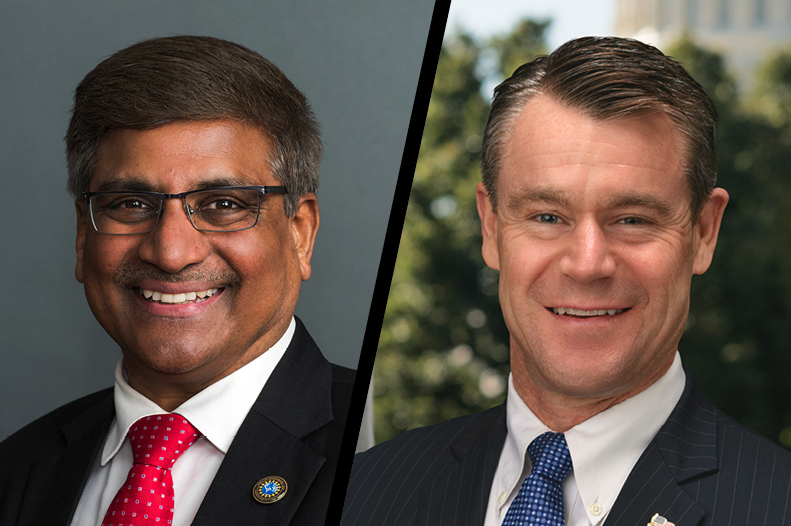Sethuraman Panchanathan, director of the U.S. National Science Foundation, and U.S. Sen. Todd Young of Indiana on Tuesday, Feb. 13, will join Purdue President Mung Chiang for a fireside chat as part of the Presidential Lecture Series.
The event is at 11 a.m. in Stewart Center’s Fowler Hall and is free to the public; registration is required. Click here to make your reservation.
“Purdue’s Presidential Lecture Series provides a regular forum for our students, faculty and staff to hear from thought leaders in a wide range of areas,” President Chiang said. “We are truly excited that Sen. Young and NSF Director Panchanathan will share with our campus community their insights on what Purdue can continue to contribute to the advancement of our country.”
Panchanathan, a computer scientist and engineer, was selected as NSF director in 2020. He also serves in leadership roles on several key interagency councils and committees, including as co-chair of the National Advisory Council on Innovation and Entrepreneurship, and is a member of the White House CHIPS Implementation Steering Council and the White House Gender Policy Council.
Young, a former member of the U.S. Marine Corps who is in his first term as Indiana’s senior senator, co-sponsored the bipartisan CHIPS and Science Act to boost domestic manufacturing of computer chips. The measure provides for $52 billion in grants and incentives for the semiconductor industry, as well as $200 billion for scientific research. Its goal: Decrease dependency on other countries, including China, and make the U.S. a tech leader.
As the NSF’s 15th director, Panchanathan (whose full name is pronounced Seth-u-ra-men Panch-a-na-than) also serves as chair of the Interagency Arctic Research Policy Committee and co-vice chair of the Council for Inclusive Innovation.
A leader in science, engineering and education for three decades, Panchanathan has had a distinguished career in higher education and government. He has designed and built knowledge enterprises that advance research innovation, strategic partnerships, entrepreneurship, global development and economic growth. His scientific contributions have advanced human-centered multimedia computing, haptic user interfaces and ubiquitous computing technologies to enhance the quality of life for those with different abilities; machine learning for multimedia applications; and media processor designs.
Prior to joining NSF, Panchanathan was appointed to serve on the National Science Board, where he was a chair of the Committee on Strategy and a member of the External Engagement and National Science and Engineering Policy committees. While he was at Arizona State, the university increased research performance fivefold, earning recognition as the nation’s fastest-growing and most innovative research university. He also was founder and director of ASU’s Center for Cognitive Ubiquitous Computing.
A fifth-generation Hoosier, Young holds several leadership positions in the U.S. Senate, serving on the committees on Finance; Foreign Relations; Commerce, Science and Transportation; and Small Business and Entrepreneurship. In January 2009 Young announced plans to run for the congressional seat in Indiana’s 9th District as a Republican. He served three terms as a representative before launching his successful bid for U.S. Senate in 2016.
Young enlisted in the U.S. Navy and was admitted to the U.S. Naval Academy, where he participated in varsity athletics and was elected a class officer. Graduating with honors, he accepted a commission in the U.S. Marine Corps, training as a rifle platoon commander and for service as an intelligence officer. While stationed in Chicago, Young earned an MBA from the University of Chicago. Honorably discharged from active duty in 2000, he spent a year in England, earning a master’s degree from the School of Advanced Study in London.
Returning to the U.S., he joined The Heritage Foundation and later worked for U.S. Sen. Richard Lugar. In 2003 Young volunteered to work for Mitch Daniels’ successful gubernatorial campaign. He earned a law degree from Indiana University in 2006 and served as assistant deputy prosecutor for Orange County, Indiana. He founded the National Organization for People vs. Irresponsible Government Spending in 2007.
About the Presidential Lecture Series
Launched in 2014 by then-Purdue President Mitch Daniels and continued by President Mung Chiang, the Presidential Lecture Series exposes Purdue students and the broader community to inspiring ideas, courageous leadership, and models of civic engagement and civil discourse. The Presidential Lecture Series has had over 40 guests of many viewpoints and perspectives and hosted some of the great intellectual, business and civic leaders of our time. As one of the world’s premier centers of scholarly leadership, Purdue is — appropriately and necessarily — a regular venue for great thinkers across a wide variety of disciplines.
